Portal:Science/Previous pictures
Newest pictures at the top
August, 16, 2006
[edit]
Deep Impact is a NASA space probe designed to study the composition of the interior of the comet Tempel 1. At 5:52 UTC on July 4, 2005, one section of the Deep Impact probe successfully impacted the comet's nucleus, excavating debris from the interior of the nucleus. Photographs of the impact showed the comet to be more dusty and less icy than expected. The impact generated a large, bright dust cloud that obscured the hoped-for view of the impact crater.
Previous space missions to comets, such as Giotto and Stardust, were fly-by missions, only able to photograph and examine the surfaces of cometary nuclei from a distance. The Deep Impact mission was the first to eject material from a comet's surface.
August, 8, 2006
[edit]
A Railgun is a form of gun that converts electrical energy—rather than the more conventional chemical energy from an explosive propellant—into projectile kinetic energy. It is not to be confused with a coilgun (Gauss gun). The term railgun is also used for conventional firearms used in the Unlimited class of benchrest shooting.
July 31, 2006
[edit]
Craniometry is the technique of measuring the bones of the skull. Craniometry was once intensively practiced in anthropology and ethnology. Human skulls can be classified into three main categories based on cephalic index: dolichocephalic: long and thin; brachycephalic: short and broad; mesocephalic: intermediate length and breadth.
The misuse of data obtained from craniometry has been compared to phrenology as a pseudoscience. The apparent scientific support of craniometric theories for racism was used to the support the racist ideologies, and ultimately genocidal policies, of the Nazi party. The uses that racist ideologues and even reputable scientists made of craniometric measurements and conclusions have been thoroughly discussed by Stephen Jay Gould in The Mismeasure of Man (1981).
However, brain volume data and other craniometric data is used in mainstream science to compare modern-day animal species, and to analyze the evolution of the human species in archeology.July 18, 2006
[edit]
A Tesla coil is a category of disruptive discharge transformer coils, named after their inventor, Nikola Tesla. Tesla coils are composed of coupled resonant electric circuits. Nikola Tesla actually experimented with a large variety of coils and configurations, so it is difficult to describe a specific mode of construction that will meet the wants of those who ask about "Tesla" coils. "Early coils" and "later coils" vary in configuration and setup. Tesla coils in general are very popular devices among high-voltage enthusiasts.
June 23, 2006
[edit]
Saturn V was a multistage liquid-fuel expendable rocket used by NASA's Apollo and Skylab programs.
The largest production model of the Saturn family of rockets, the Saturn V was designed under the direction of Wernher von Braun at the Marshall Space Flight Center in Huntsville, Alabama, with Boeing, North American Aviation, Douglas Aircraft Company, and IBM as the lead contractors. It remains the most powerful launch vehicle ever brought to operational status, from a height, weight and payload standpoint, although the Russian Energia, which flew only two test missions, had slightly more takeoff thrust.
In all, NASA launched thirteen Saturn V rockets between 1967 and 1973, with no loss of payload. The design payload was the manned Apollo spacecraft used by NASA for moon landings, and the Saturn V went on to launch the Skylab space station.
The three stages of the Saturn V were developed by various NASA contractors, but following a sequence of mergers and takeovers all of them are now owned by Boeing. Each first and second stage was test fired at the Stennis Space Center located near Bay St. Louis, Mississippi. The facility was later used for the testing and verification of the Space Shuttle's Main Engines.
June 1, 2006
[edit]
Sonoluminescence is the emission of short bursts of light from imploding bubbles in a liquid when excited by sound. The effect was first discovered at the University of Cologne in 1934 as a result of work on sonar. H. Frenzel and H. Schultes put an ultrasound transducer in a tank of photographic developer fluid. They hoped to speed up the development process. Instead, they noticed tiny dots on the film after developing, and realized that the bubbles in the fluid were emitting light with the ultrasound turned on. It was too difficult to analyze the effect in early experiments because of the complex environment of a large number of short-lived bubbles. (This experiment is also ascribed to N. Marinesco and J.J. Trillat in 1933).
May 25, 2006
[edit]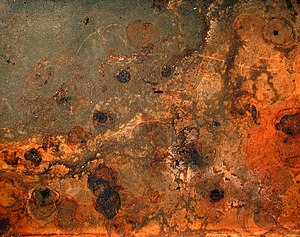
Rust is the substance formed when iron compounds corrode in the presence of oxygen and water. It is a mixture of iron oxides and hydroxides. Rusting is a common term for corrosion, and usually corrosion of steel. Iron is found naturally in the ore haematite as iron oxide, and metallic iron tends to return to a similar state when exposed to air, (hydrogen, oxygen, nitrogen, etc.) and water. This corrosion is due to the oxidation reaction when iron metal returns to an energetically favourable state. Energy is given off when rust forms. The process of rusting can be summarized as three basic stages: The formation of iron(II) ions from the metal; the formation of hydroxide ions; and their reaction together, with the addition of oxygen, to create rust.
May 14, 2006
[edit]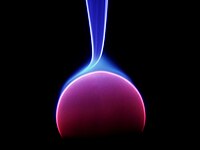
A plasma lamp is usually a clear glass orb, filled with a mixture of various inert gases at low pressure, and driven by high frequency alternating current at high voltage (approx. 35kHz, 2-5kV), generated by a high voltage transformer. A much smaller orb in its centre serves as an electrode. Beams or snakes of "light" (actually emergent patterns in ionized gas) extend from the inner electrode to the outer glass container, giving an appearance similar to multiple constant beams of coloured lightning. The beams first follow the electric field lines of the dipole, but move up due to convection.
May 4, 2006
[edit]
Direct current-generated plasma (violet) enhances the growth of carbon nanotubes in this laboratory-scale PECVD apparatus. Plasma-enhanced chemical vapor deposition processes utilize plasma to enhance chemical reaction rates. PECVD processing allows deposition at lower temperatures, which is often critical in the manufacture of semiconductors. The red color in the picture is black-body radiation.
April 28, 2006
[edit]Lightning is a powerful natural electrostatic discharge produced during a thunderstorm. This abrupt electric discharge is accompanied by the emission of visible light and other forms of electromagnetic radiation. The electric current passing through the discharge channels rapidly heats and expands the air into plasma, producing acoustic shock waves (thunder) in the atmosphere.
March 31, 2006
[edit]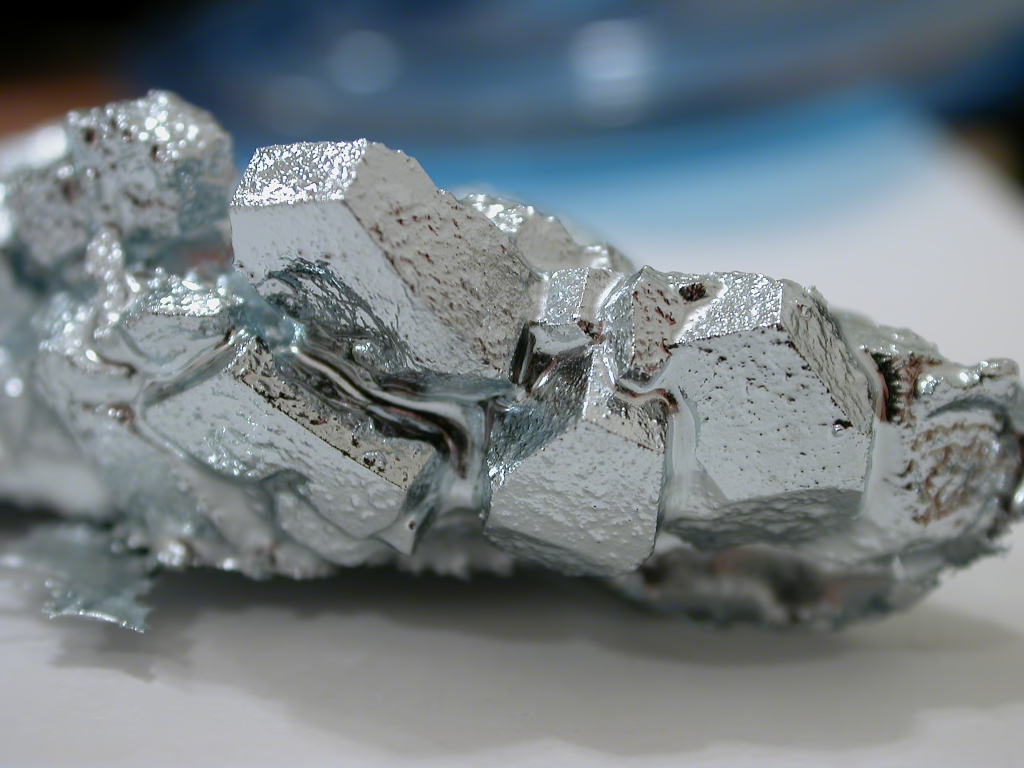
February 26, 2006
[edit]
February 1, 2006
[edit]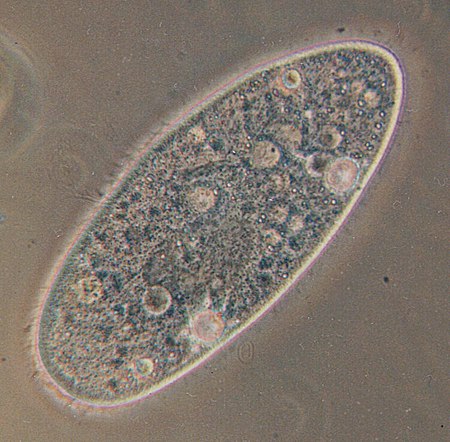
Paramecium aurelia, the best known of all ciliates. The bubbles throughout the cell are vacuoles. The entire surface is covered in cilia, which are blurred by their rapid movement.
January 15, 2006
[edit]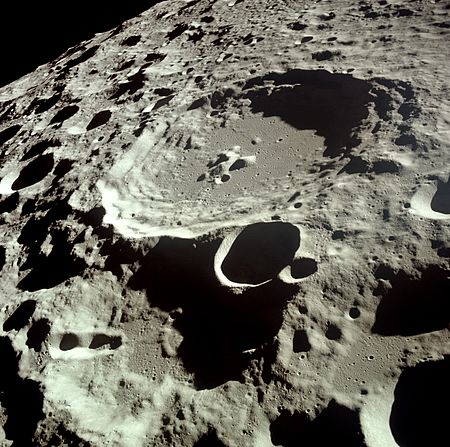
The far side of the Moon as photographed by the crew of Apollo 11. The largest crater is Daedalus crater.
January 8, 2006
[edit]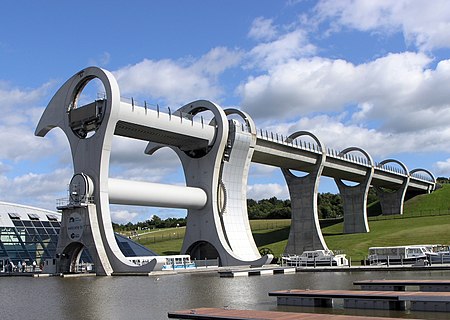
December 28, 2005
[edit]
The Hubble Space Telescope as seen from the Space Shuttle Discovery on mission STS-82.
May 8, 2005
[edit]
